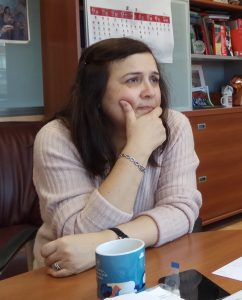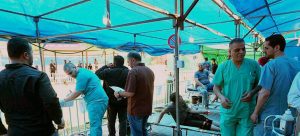 Juani Rishmawi is a woman from Madrid who has lived in Palestine for the last 33 years. There she lives and fights against the difficulties of having to inhabit a land occupied by the Israeli army, which does everything possible to harass and terrify the Palestinian people. Withholding the medical supplies transported by the boats of Freedom Flotilla – Rumbo a Gaza is one of these measures that, in Juani’s opinion, “has the purpose of warning the organizations so that they stop any kind of help to the Strip”.
Juani Rishmawi is a woman from Madrid who has lived in Palestine for the last 33 years. There she lives and fights against the difficulties of having to inhabit a land occupied by the Israeli army, which does everything possible to harass and terrify the Palestinian people. Withholding the medical supplies transported by the boats of Freedom Flotilla – Rumbo a Gaza is one of these measures that, in Juani’s opinion, “has the purpose of warning the organizations so that they stop any kind of help to the Strip”.
Juani Rishmawi works with the NGO Health Work Committees (HWC) which takes care of providing health assistance to the towns and villages of the West Bank. When their activity began, back in 1988, they also worked in Gaza, but the isolation suffered by the Strip made it impossible for HWC to go on working there. The Israeli government also forbids them to carry out their health programs in the area east of Jerusalem, where they formerly were in charge of vaccination campaigns for Palestinian school children. At the moment Juani Rishmawi is in Spain, on one of her customary trips here, and she has kindly accepted to share with us the latest news from battered Palestine. She has also brought with her photographs of the health situation in the Gaza Strip.
- What is the situation like right now in Palestine?
The situation in Palestine is extremely serious, and it will go on being so as long as as both occupation and violation of the human rights of the native population persist. Israeli nationalists have declared in a parliamentary resolution that the population of Israel has to be Jewish, and this leaves minorities and other sectors of the population in a situation of clear discrimination, and especially those nearly five million Palestinians submitted to a situation of Apartheid. Nor does the Palestinian authority solve problems or help their people. Jerusalem is losing Palestinian population daily – they are being expelled and their homes and shops are being wrecked. Settlements grow every day and the Israeli government has just decided to undertake the building of 2,000 new houses in different settlements in the West Bank, totally disregarding the UN resolutions and breaking all the peace agreements. The Palestinian population is becoming more and more impoverished every day.
- Have you got news of the situation in Gaza?
Gaza is considered to be the biggest open-air prison in the world. Nearly 2 million Palestinians are living in totally inhuman conditions. After two massive bombing attacks (2008 and 2014) the destruction of thousands of homes left over 100,000 families in the open. The destruction of factories brought about a rise in unemployment which now stands at 65% of the population. Electricity is not working, drinkable water is infected and the population is slowly being extinguished. Nearly 20 Palestinians die each month because of lack of medical treatment, and there are daily losses due to killings by soldiers at the border when people go on a demonstration. All this gives an idea of the situation in Gaza. It is terrible to listen to your friends ask you for help to get out of there because it is hell. The situation is critical, extremely critical.

Punishment to the population of Gaza
- What do you think about withholding the medical supplies carried by the boats of the Freedom Flotilla – Rumbo a Gaza while the health situation deteriorates in the Strip?
Withholding the medicines is a premeditated political decision on the Israeli authorities’ part as a punishment to the civil population of Gaza, and also to send a message to the international organizations so that they stop sending help. Gaza has many pressing needs and Israel plays on that fact in order to bring pressure to bear on the population.
- How do you manage in the daily work at the HWC hospitals?
The daily life in our centres and hospitals is dedicated to looking after the population in all the areas of attention. If care cannot be dispensed because of lack of resources they are advised where to go in order to find what they need. We are grateful for the trust that the population has in our work. It is important that they know that we are there in order to look after them. So, when a specialist is needed in one of our centres and is not available, we try to take on a new doctor so that patients don’t have to travel away from home. Mobility is one of the worst problems, there are countless checkpoints between villages and towns (more than 250 checkpoints, approximately) that make it very difficult for the Palestinian people to travel. So, if people cannot come to the health centre it is we who go to give medical attention to their homes by means of a mobile clinic. It is important that medical attention and care can reach the whole of the population.
We buy the medicines in Palestine in order to help their economy
- Is it difficult to get medical supplies for your hospitals?
In the West Bank, if you have got the money, you can get nearly all the necessary medicines. There are seven pharmaceutical companies in Palestine and we always try to buy from them so that it helps the Palestinian economy, although there are many important medicines which they are not allowed to manufacture due to their components. So, sometimes we have to get our supplies from Israeli companies. But all in all the supply is good. In Gaza the situation is quite different because the medicines have to cross the border and a permit from the army is needed in order to do so. This dependence on the army’s authorization makes access to medicines all the more difficult and, as a result many medicines and medical equipment are lacking. The most vulnerable patients are those who suffer cancer and do not have access to their treatment, as well as people who have to undergo complicated surgery. The death rate in Gaza due to lack of treatment has gone up very high in the last year.
- What is the purpose of your trip to Spain?
I come to Spain twice a year. My work consists of obtaining financial help for projects and programs of our organization, and also to raise awareness about the situation in Palestine. I give talks about Palestine at all levels, especially about health topics which is the specialty of the NGO I am representing, the Health Work Committees.
- What is happening with solidarity in our country? Do you find it more difficult than before to achieve financial help for your projects?
The economic crisis which began in 2008 has had a great impact on the help to developing countries; we have lost a great deal of financial support. In the years before the crisis the support to our organization in Spain was 60% of the total income from abroad. In the last few years we have managed to survive – lacking in many things, but with courage and hard work on the part of the HWC’s workers. And we have made a breakthrough. In the last two years we have improved our performance so we can propose more ambitious projects. In Palestine solving difficulties is just the normal thing and therefore we know how to adapt to the situation and now we are moving in order to achieve new financial resources from other countries. However, we should not fail to recognize that the Spanish population is one of the most supportive of Palestine and this means that there is still important help coming from them. Trust in our work has given our organization some stability in order to go on with our work.
Practising BDS is the best means to help Palestine
- What would you say to the Spanish people about how they can help the Palestinian people?
There are different ways to help Palestine. Some might contribute with financial help, others can raise awareness in the population about the situation there. And one of the most important means is the campaign of Boycott, Divestment and Sanctions (BDS). This is a non-violent movement which defends people living under a situation of apartheid, as it is the case in Palestine. Every individual can make their own boycott, by not buying Israelí products in solidarity with Palestinians and against the violation of their human rights. Also institutional support declaring spaces free from apartheid and promoting sanctions against Israel for disregarding UN resolutions. There is also a cultural and sports boycott to let Israel know that if they persist in their xenophobic and discriminating policies against the Palestinian people, there will always be a movement against them. There is of course a variety of means, but for me the most important thing is that we should not forget a people who desperately needs to be helped in their dire situation after 70 years of colonization. The only thing we wish is a free Palestine.
By Blanca Ortega, journalist, member of Sodepaz and supporter of Rumbo a Gaza.









All of support
All my heart
We stuggle